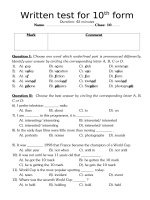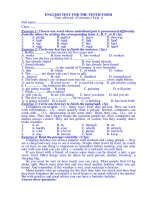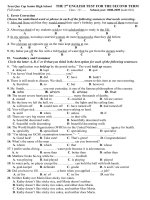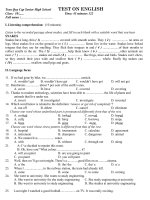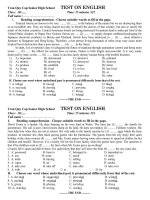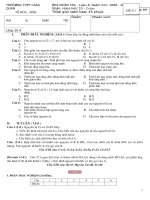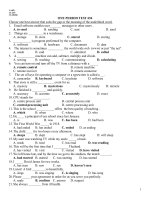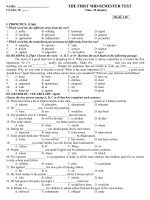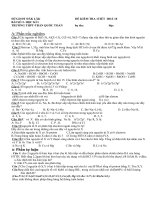Kiểm tra TA 10 lần 2 ky I
Bạn đang xem bản rút gọn của tài liệu. Xem và tải ngay bản đầy đủ của tài liệu tại đây (50.14 KB, 5 trang )
english test for the tenth form
Time allowed: 45 minutes (Task 1)
Full name: .........................................
Class: ......
Exercise 1: Choose one word whose underlined part is pronounced differently
from the others by circling the corresponding letter A, B, C, or D (1p)
1. A. prefer B. perfect C. nerve D. discover
2. A. look B. cook C. foot D. food
3. A. top B. more C. box D. boss
4. A. near B. seat C. meat D. teach
Exercise 2: Circle one best key to finish the sentence. (2ps)
1. Bobby ............ for this factory for five years now.
A. works B. have worked C. has worked D. worked
2. They lost the key yesterday but it ........................
A. has already found B. was found already
C. found already D. has already been found
3. Hanoi,.........................is the capital of Vietnam, is very beautiful.
A. that B. which C. of which D. where
4. The ........... are those who can’t hear or talk.
A. injured B. rich C. disabled D. unemployed
5. The baby doesn’t cry so much now but she ....................... every night before.
A. use to crying B. used to cry C. is used for crying D. get used to crying
6. I.................. my bedroom this weekend.
A. am going to paint B. paint C. painting D. will paint
7. What............... this evening?
A. will you do B. are you doing C. have you done D. did you do
8. The new school ........................... for two year.
A. is going to build B. is built C. is building D. has been built
Exercise 3: Circle one best key to finish the paragraph. (1p)
Computers are helpful... (1)... many ways. First, they are fast. They can work
with information... (2)... more quickly than a person. Second, computers can work
with ... (3)... information at the same time. Third, they can... (4)... for a long time.
They don’t forget things the common people do. Also, computers are almost
always correct. They are not perfect, of course, but they usually don’t make
mistakes.
1. A. in B. by C. through D. on
2. A. hardly B. even C. wholly D. entirely
3. A. a lot B. a lot of C. plenty D. much of
4. A. stay B. remain C. hold D. keep
Exercise 4: Read the passage carefully: (2.5ps)
Camping holidays are always popular with students and young people – they
are a cheap and easy way to see a country. People often travel by train, by coach
or on foot, so one thing is important to remember before starting: you can only
take with you what you can carry – usually in a rucksack on your back.
If you travel with a friend, of course some items can be shared; a tent, a gas
stove, food. Other things must be taken by each person; clothes, footwear, a
sleeping bag.
So you must be sure of how much you can carry. Most people find 10 kg about
right. Much more than that and you need another holiday when you get home!
And remember, if the weather is wet, your rucksack is heavier.
Many people who go camping for the first time take too much and then find
they have forgotten the essentials; a tin of beans is no good without a tin opener!
But with practice and good advice you can have a fantastic holiday.
Answer these questions:
1. Why are camping holidays very popular with students and young people?
.............................................................................................................................
2. How do people often travel?
.............................................................................................................................
3. What are the things that must be taken by each person?
.............................................................................................................................
4. Do many people who go camping for the first time take too things?
.............................................................................................................................
5. Do the good advices help you to have a fantastic holiday?
.............................................................................................................................
Exercise 5: Build a new sentence with the passive voice form after the model:
They have build a new bridge across the river.
A new bridge has been built across the river.
1. They have washed the dishes for 2 hours.
.............................................................................................................................
2. Somebody has taken the book away.
.............................................................................................................................
3. The students have seen the film since you went out.
.............................................................................................................................
4. They will widen the road next year.
.............................................................................................................................
5. They should deliver milk every morning.
.............................................................................................................................
the end
english test for the tenth form
Time allowed: 45 minutes (Task 2)
Full name: .........................................
Class: ......
Exercise 1: Choose one word whose underlined part is pronounced differently
from the others by circling the corresponding letter A, B, C, or D (1p)
1. A. prefer B. perfect C. nerve D. discover
2. A. food B. school C. foot D. afternoon
3. A. sugar B. future C. student D. uniform
4. A. meat B. teach C. near D. seat
Exercise 2: Circle one best key to finish the sentence. (2ps)
1. Bobby ............ for this factory five years ago.
A. works B. have worked C. has worked D. worked
2. Nam lost some pens but they ........................
A. has already been found B. was found already
C. found already D. have already been found
3. I met the boy ......... knows you.
A. whom B. which C. who D. where
4. The ........... are those who have a lot of money.
A. injured B. rich C. disabled D. unemployed
5. Mr Brown doesn’t smoke now, but he ................ a lot.
A. used to smoke B. use to smoke C. is used smoke D. get used to smoke
6. I.................. my bedroom this weekend.
A. am going to paint B. paint C. painting D. will paint
7. What............... on Sunday afternoon?
A. will you do B. are you doing C. have you done D. did you do
8. I feel so terrible. I think I .............. sick.
A. am going to be B. am C. am be D. have been
Exercise 3: Circle one best key to finish the paragraph. (1p)
Computers are helpful... (1)... many ways. First, they are fast. They can work
with information... (2)... more quickly than a person. Second, computers can work
with ... (3)... information at the same time. Third, they can... (4)... for a long time.
They don’t forget things the common people do. Also, computers are almost
always correct. They are not perfect, of course, but they usually don’t make
mistakes.
1. C. through D. on A. in B. by
2. C. wholly D. entirely A. hardly B. even
3. C. plenty D. much of A. a lot B. a lot of
4. C. hold D. keep A. stay B. remain
Exercise 4: Read the passage carefully: (2.5ps)
Camping holidays are always popular with students and young people – they
are a cheap and easy way to see a country. People often travel by train, by coach
or on foot, so one thing is important to remember before starting: you can only
take with you what you can carry – usually in a rucksack on your back.
If you travel with a friend, of course some items can be shared; a tent, a gas
stove, food. Other things must be taken by each person; clothes, footwear, a
sleeping bag.
So you must be sure of how much you can carry. Most people find 10 kg about
right. Much more than that and you need another holiday when you get home!
And remember, if the weather is wet, your rucksack is heavier.
Many people who go camping for the first time take too much and then find
they have forgotten the essentials; a tin of beans is no good without a tin opener!
But with practice and good advice you can have a fantastic holiday.
Answer these questions:
1. Why are camping holidays very popular with students and young people?
.............................................................................................................................
2. How do people often travel?
.............................................................................................................................
3. What are the things that must be taken by each person?
.............................................................................................................................
4. Do many people who go camping for the first time take too things?
.............................................................................................................................
5. Do the good advices help you to have a fantastic holiday?
.............................................................................................................................
Exercise 5: Build a new sentence with the passive voice form after the model:
They have build a new bridge across the river.
A new bridge has been built across the river.
1. The people have done this work for 2 hours.
.............................................................................................................................
2. Nam has invited Ha to the party.
.............................................................................................................................
3. The students have cleaned this room since you went out.
.............................................................................................................................
4. Dangerous driving causes many accidents every year.
.............................................................................................................................
5. They should decorate the room.
.............................................................................................................................
the end
